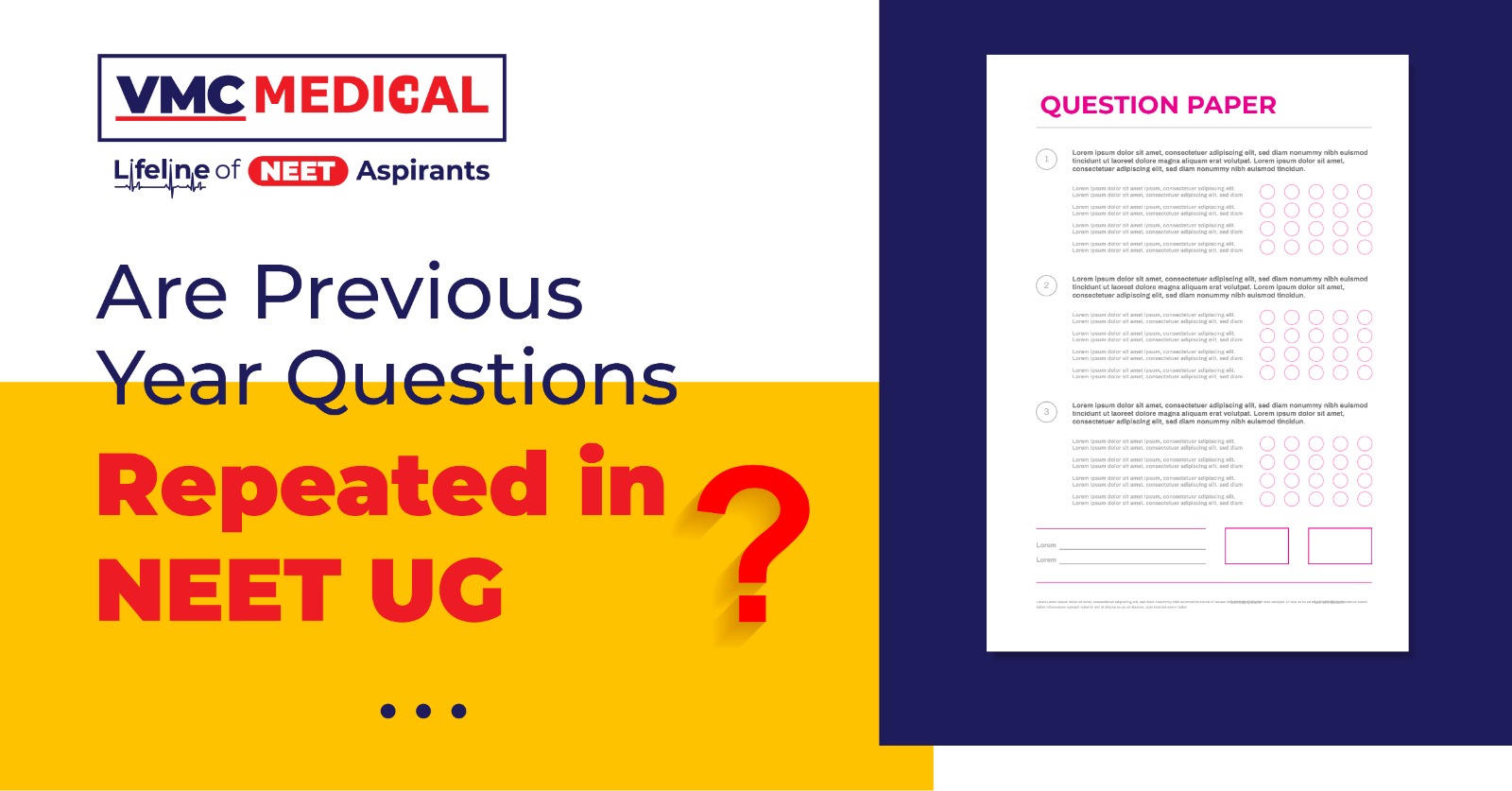Are Previous Year Questions Repeated in NEET UG?
 Posted On
Posted On
Preparing for the NEET UG (National Eligibility cum Entrance Test for Undergraduate) often leads candidates to wonder if past questions will make a reappearance in future exams. The National Testing Agency (NTA) oversees NEET, India’s premier medical entrance exam, and while it doesn’t officially confirm question repetitions, a careful review of previous question papers reveals an interesting trend. This insight highlights the value of analyzing past questions, as patterns often emerge that can inform a student’s study plan.
Understanding the Trend: Do Questions Repeat in NEET UG?
While it is rare for questions to be exactly repeated from previous years, there are instances where questions—or at least similar concepts—reappear. Particularly in Physics, questions may be structured similarly or even replicated with slight variations. Chemistry and Biology, too, may include familiar topics or types of questions with modified data. While direct question repetition is infrequent, the core concepts underlying the questions often remain consistent, giving students who study past questions a notable advantage.
- Physics Questions: Commonly Reused Themes
- In Physics, some questions from JEE Main papers have been known to make their way into NEET exam, often with minor adjustments. For instance, rather than copying an entire question, NTA might slightly modify values or adjust contexts, but the core physics principles and types of calculations required remain similar.
- Chemistry Questions: Occasionally Recycled
- Chemistry questions tend to be more unique, though there are occasional instances of well-known problems appearing again with altered data. Many of these questions focus on foundational principles, so students who prepare with a deep understanding of fundamental Chemistry topics tend to find an advantage, even if the questions themselves are not direct repeats.
- Biology Questions: Conceptual Consistency
- Biology, a subject with vast factual content, sees occasional repetitions, typically involving high-priority topics like genetics, plant and human physiology, or evolutionary principles. While not identical, these questions test similar concepts that have been featured in prior exams, underscoring the importance of comprehensive preparation.
Why Solving Previous Year Questions is Crucial
Many NEET aspirants invest significant time in solving previous years’ questions, and for good reason. The questions serve as a valuable practice tool to understand the exam’s structure and question variety. Additionally, solving past questions helps students gain insights into NEET’s evolving trends and develop time management skills essential for the actual test.
Here are some of the benefits:
- Exam Pattern Familiarity
Past questions reveal recurring patterns that give students a sense of NEET’s emphasis areas, question formats, and difficulty distribution. This familiarity allows students to approach the exam with confidence, as they have already practiced similar types of questions. - Speed and Accuracy Development
Practicing past questions can significantly improve a candidate’s speed and accuracy, two key components for excelling in NEET, which is a time-bound test. By repeatedly solving past papers, students learn to quickly identify and solve questions, a skill that is especially useful in physics and chemistry sections. - Mastering Topic Variety and Difficulty Levels
Each question paper has a diverse mix of questions ranging in complexity. Familiarizing oneself with past papers helps in understanding the spectrum of easy, moderate, and difficult questions, preparing students to handle the varying levels of difficulty in the actual exam. - Self-Evaluation and Progress Tracking
Solving previous year questions is an effective method for self-assessment. By checking their answers against the solutions and analyzing errors, students can pinpoint their weak areas, allowing them to refine their study strategies.
How Far Back Should You Go?
NEET aspirants are often advised to cover at least the past 10-15 years of question papers. This may seem extensive, but it’s beneficial for reinforcing foundational concepts and staying updated with the kinds of questions that are frequently repeated. Prioritizing topic-wise question papers for Biology, Chemistry, and Physics allows students to solidify their understanding across all subjects. It’s also helpful to use these past papers as mock tests, simulating real exam conditions to practice time management.
The Role of Mock Tests and Past Papers
Treating previous years’ papers as part of a mock test routine is particularly effective. This method provides a realistic feel of the NEET exam environment and helps students become comfortable working within time limits. For instance:
- Mock Tests as a Study Strategy: Regular mock tests build a student’s confidence, improve their time management skills, and refine their understanding of question trends.
- Subject-Specific Preparation: By solving subject-specific past questions, such as focusing on Physics questions from JEE Mains or Chemistry questions from NEET, students can gain a clearer picture of what to expect.
Similarities with JEE Mains and AIIMS Questions
While NEET is designed to be distinct, there is sometimes overlap with JEE Mains and, to a lesser extent, AIIMS questions in terms of fundamental concepts, especially in Physics and Chemistry. This alignment emphasizes the importance of maintaining a primary focus on NEET while also being aware of related exams’ question patterns for a more robust preparation strategy.
Strategic Approach to Using Previous Year Questions
A balanced strategy toward previous year question (PYQ) preparation can significantly boost NEET scores. Here are some tips for effectively utilizing past papers:
- Identify and Focus on High-Yield Topics
Pay extra attention to high-yield topics in each subject, as these are more likely to be featured in the exam. Topics that have consistently appeared over the years include Genetics, Thermodynamics, and Mechanics. - Analyze Mistakes and Refine Techniques
After each practice session, review mistakes thoroughly to prevent them in the future. This can be a game-changer for improving weak areas and fine-tuning overall performance. - Use Updated Study Materials
While solving past papers is beneficial, it should be complemented by updated resources and NEET preparation books. Newer editions of study materials often include insights on recent trends and exam formats. - Diversify Practice with Both MCQs and Conceptual Questions
Since NEET heavily relies on multiple-choice questions (MCQs), practice extensively with these formats while also strengthening your understanding of the underlying concepts. This will help ensure that you are ready to handle variations in question structure, even if the concepts are repeated. - Solve Questions from the Past 15 Years for Comprehensive Coverage
It is beneficial to study questions spanning the last 15 years as this provides a thorough understanding of recurring themes and question types.
Frequently Asked Questions
- Are previous year questions repeated in NEET UG?
Although there’s no explicit rule on question repetition, it is common for certain types or themes of questions to reappear. These repetitions are not identical but often involve similar concepts. - Is solving the last 10 years’ questions enough for NEET?
While the last 10 years’ papers provide a strong foundation, extending this to 15 years can offer additional insights into recurring patterns and important topics, maximizing preparedness. - How many previous year questions should I solve?
Aim to complete at least the past 10 years for a comprehensive understanding, though extending to 15 years can enhance topic familiarity and boost confidence. - Are NEET UG previous year questions enough for preparation?
PYQs are essential, but they should be part of a broader study plan that includes updated study materials, mock tests, and NCERT textbooks.
Closing Thoughts
While exact questions may not reappear in NEET, similar concepts and patterns do. By integrating previous year questions into your NEET preparation, you can gain an invaluable familiarity with the exam’s layout, refine your speed and accuracy, and develop effective time management strategies. This balanced approach of blending PYQ practice with updated resources ensures a comprehensive and targeted preparation plan, readying students for the challenge of NEET UG and increasing their chances of success.




